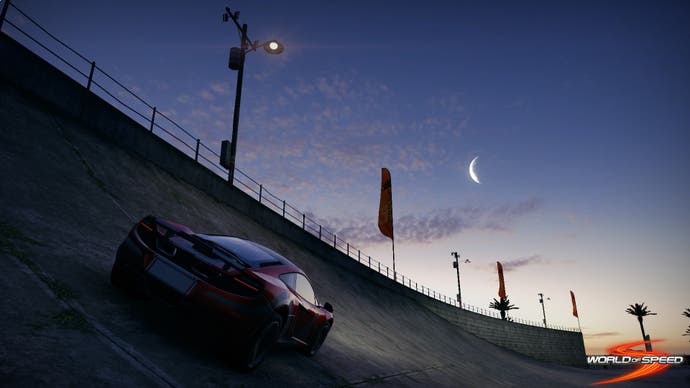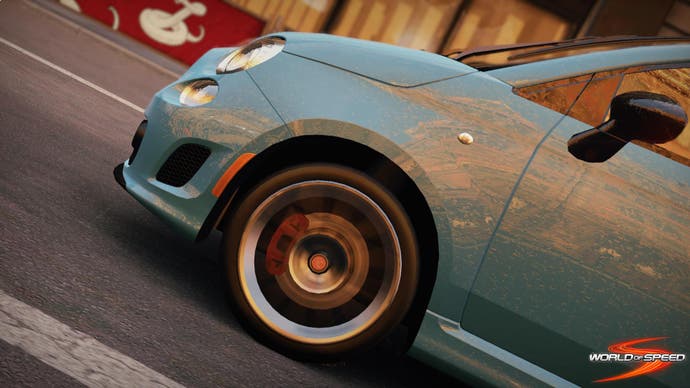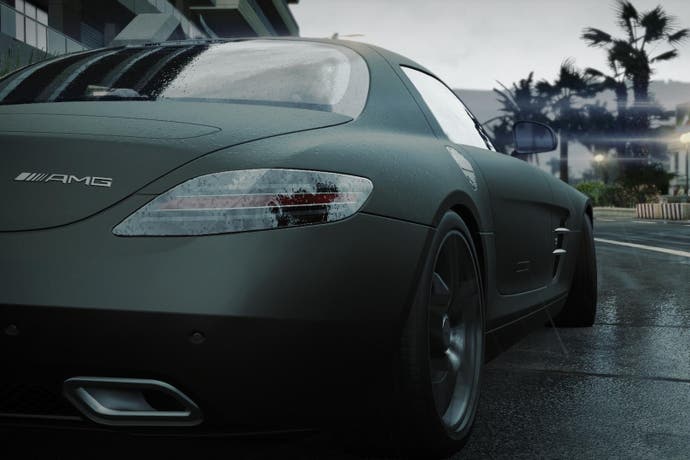Slightly Mad's World of Speed has not held back Project Cars
But right now, its tepid handling is holding itself back.
Slightly Mad Studios, the racing game developer renowned for its team's work on GTR2 and the sadly short-lived Shift series, is making one of the most exciting new entries in the genre - one that promises to challenge the duopoly of Forza and Gran Turismo and a game that looks achingly, at times shockingly beautiful.
It is also making this.
World of Speed, a free-to-play, massively multiplayer team-based racer that's being brought to market with the help of newcomers My.com, doesn't quite get the heart thumping in the same way Project Cars does. It gets the blood boiling, perhaps, if you've seen the original release date for Slightly Mad's crowd-funded racer sail past while it announces a partnership with a publisher rich with money - and if you're one of the investors in an at times confusing scheme, you might be wondering where exactly your money's gone to.

"It's something that's been pointed out before," explains World of Speed's producer Pete Morrish. "There is no cross-over between the two games in terms of the way that they're financed. There's been no money on the crowdfunding side of Project Cars go towards this game. In fact, because this is a more traditionally funded game with a developer/publisher model, some of the learning we've had has gone into the underpinning, so both projects have benefited."
The point has been laboured on Slightly Mad's own forums, where the development of Project Cars - as with all crowd-funded games - takes place with a degree of transparency. "It's one of the realities of running a development studio," says Morrish. "Project Cars is still underway - and we have a target in mind. The way that we structure these things is that we're fully open with the community - there has been no impact, and there are no conflicts going on. We can sleep safely at night knowing that we've done the right thing. We don't get anywhere by screwing people over."
That's a mantra that World of Speed is keen to stick to in its adoption of a free-to-play model - the very notion of which has become toxic to so many traditional gamers. How exactly it's going to back up its good intentions remains to be seen, but Slightly Mad is at pains to point out it's learnt from some of the more cynical free-to-play games on the market.
"We're not allowed to talk about the specifics of monetisation - but we can talk about the philosophy that's underpinning what we're doing," says Morrish. "The easiest way of doing that is telling you what we don't sell - and what we don't sell is competitive advantage. We're fervent believers that to have a successful game as a service, it's all about the long-term, about respecting the community and offering trust, basically. It's easy to set up a system whereby we can extract money out of people, but we don't want to do that. We're here to make a community of fans and super-fans, and have them enjoy our game."
"We can sleep safely at night knowing that we've done the right thing. We don't get anywhere by screwing people over."

If the monetisation of World of Speed, and its relationship with Project Cars, aren't keeping the team up at night, there are other aspects of the game that possibly should. World of Speed's got the handsome looks of its cousin, all shown off at a preview event in a San Francisco level that crumbles convincingly as four players tear through its violently undulating streets, and its got some smart ideas of its own. Instead of focussing on the race for first place, players work together in teams to fulfil a set of objectives - slipstream for a set amount of time, or accumulate a set distance drifting - and it's a set-up that works well in subtly shifting the dynamic of events. The idea is to get together a racing game that mimics the thrill of an MMO raid, with teams assigning roles and kitting out their cars accordingly to help fulfil them.
Such grand ideas are completely lost, however, in handling that is - to put it in the politest possible terms - tepid. You'll find more convincing weight transfer in most 16-bit racers, while brakes don't seem to have any bite but rather do little more than prolong the boredom that sets in seconds after a race commences. World of Speed is explicit about the fact that it's no simulation, but it seems to have forgotten that's no excuse not to engage the player, and certainly no reason to forget about the complexities that make arcade racers such as Criterion's stable such a joy to play.
The issue is at least acknowledged by Morrish and Slightly Mad, and it's one they're working on a solution to. Other questions remain, too - Eutechnyx's Auto Club Revolution made a play for a more casual free-to-play market on PC, and despite the backing of large parts of the motor industry as well as vehicle handling that sits neatly between the world of arcade and simulation, it's so far struggled to break out beyond its core community. Here's hoping World of Speed has some more convincing answers, because it'd be a shame for its sumptuous realisations of real-world locations, and its smart appropriation of MMO staples, to fail at the fundamentals.

